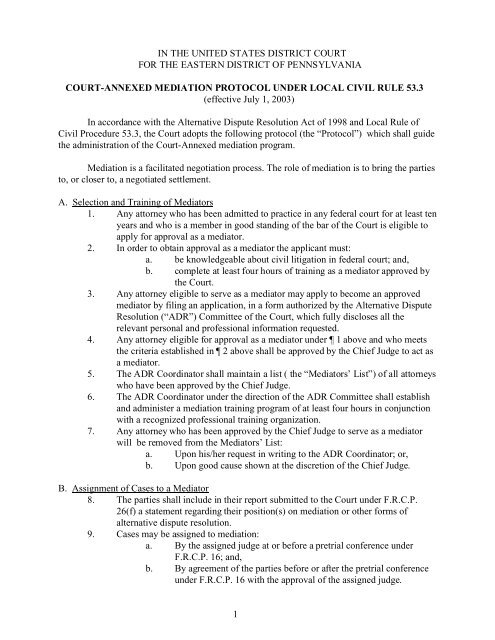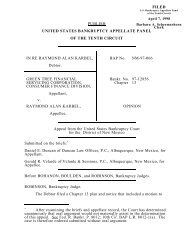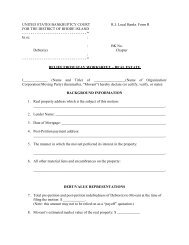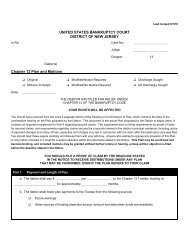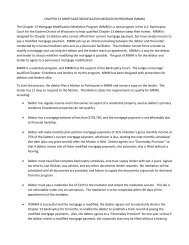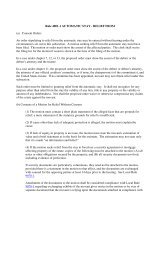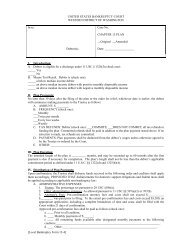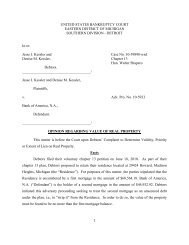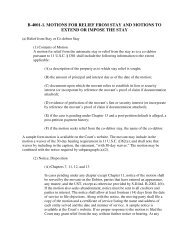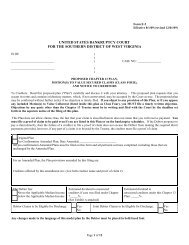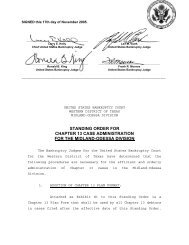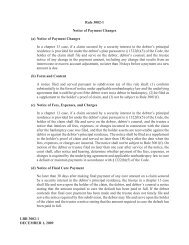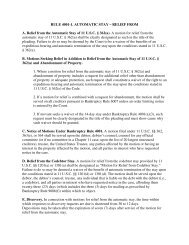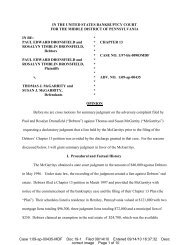court-annexed mediation protocol under local civil rule
court-annexed mediation protocol under local civil rule
court-annexed mediation protocol under local civil rule
You also want an ePaper? Increase the reach of your titles
YUMPU automatically turns print PDFs into web optimized ePapers that Google loves.
IN THE UNITED STATES DISTRICT COURT<br />
FOR THE EASTERN DISTRICT OF PENNSYLVANIA<br />
COURT-ANNEXED MEDIATION PROTOCOL UNDER LOCAL CIVIL RULE 53.3<br />
(effective July 1, 2003)<br />
In accordance with the Alternative Dispute Resolution Act of 1998 and Local Rule of<br />
Civil Procedure 53.3, the Court adopts the following <strong>protocol</strong> (the “Protocol”) which shall guide<br />
the administration of the Court-Annexed <strong>mediation</strong> program.<br />
Mediation is a facilitated negotiation process. The role of <strong>mediation</strong> is to bring the parties<br />
to, or closer to, a negotiated settlement.<br />
A. Selection and Training of Mediators<br />
1. Any attorney who has been admitted to practice in any federal <strong>court</strong> for at least ten<br />
years and who is a member in good standing of the bar of the Court is eligible to<br />
apply for approval as a mediator.<br />
2. In order to obtain approval as a mediator the applicant must:<br />
a. be knowledgeable about <strong>civil</strong> litigation in federal <strong>court</strong>; and,<br />
b. complete at least four hours of training as a mediator approved by<br />
the Court.<br />
3. Any attorney eligible to serve as a mediator may apply to become an approved<br />
mediator by filing an application, in a form authorized by the Alternative Dispute<br />
Resolution (“ADR”) Committee of the Court, which fully discloses all the<br />
relevant personal and professional information requested.<br />
4. Any attorney eligible for approval as a mediator <strong>under</strong> 1 above and who meets<br />
the criteria established in 2 above shall be approved by the Chief Judge to act as<br />
a mediator.<br />
5. The ADR Coordinator shall maintain a list ( the “Mediators’ List”) of all attorneys<br />
who have been approved by the Chief Judge.<br />
6. The ADR Coordinator <strong>under</strong> the direction of the ADR Committee shall establish<br />
and administer a <strong>mediation</strong> training program of at least four hours in conjunction<br />
with a recognized professional training organization.<br />
7. Any attorney who has been approved by the Chief Judge to serve as a mediator<br />
will be removed from the Mediators’ List:<br />
a. Upon his/her request in writing to the ADR Coordinator; or,<br />
b. Upon good cause shown at the discretion of the Chief Judge.<br />
B. Assignment of Cases to a Mediator<br />
8. The parties shall include in their report submitted to the Court <strong>under</strong> F.R.C.P.<br />
26(f) a statement regarding their position(s) on <strong>mediation</strong> or other forms of<br />
alternative dispute resolution.<br />
9. Cases may be assigned to <strong>mediation</strong>:<br />
a. By the assigned judge at or before a pretrial conference <strong>under</strong><br />
F.R.C.P. 16; and,<br />
b. By agreement of the parties before or after the pretrial conference<br />
<strong>under</strong> F.R.C.P. 16 with the approval of the assigned judge.<br />
1
10. Promptly after a case has been assigned to <strong>mediation</strong>, the ADR Coordinator shall<br />
designate a mediator from the Mediators’ List to conduct <strong>mediation</strong> in the case.<br />
11. The designation of a mediator from the Mediators’ List shall be made on a<br />
rotating basis unless (a) a specific mediator on the list is requested by the parties<br />
and approved by the assigned judge or (b) a specific mediator is designated to<br />
serve in a case by the assigned judge. Designation <strong>under</strong> (a) or (b) shall only be<br />
made after consultation with the ADR Coordinator in order to avoid<br />
overburdening any mediator.<br />
12. Persons acting as mediators <strong>under</strong> this <strong>rule</strong> are assisting the Court in performing<br />
its judicial function. They shall be disqualified for bias or prejudice as provided<br />
by 28 U.S.C. 144 and shall disqualify themselves in any action in which they<br />
would be required <strong>under</strong> 28 U.S.C. 455 to disqualify themselves if they were a<br />
justice, judge or magistrate judge.<br />
13. If any time after being designated to serve on a case, the designated mediator shall<br />
be unable or unwilling to serve, the ADR Coordinator shall designate a new<br />
mediator in accordance with the procedures set forth in 11 for designation of<br />
mediators.<br />
14. Once a mediator has been designated (See 10) and has accepted the designation,<br />
the ADR Coordinator shall notify the assigned judge and counsel of the<br />
designation, fix a date and time for the <strong>mediation</strong> and assign a room in the<br />
<strong>court</strong>house or in such other facility as the ADR Coordinator deems appropriate to<br />
conduct the <strong>mediation</strong>.<br />
15. If the time fixed for any conference is not convenient, the mediator is authorized<br />
to change it, provided the conference takes place within 15 days of the date fixed<br />
and the ADR Coordinator gives notice of the change at the request of the<br />
mediator. Any postponement of more than 15 days after that date must be<br />
submitted to the ADR Coordinator for approval by the assigned judge.<br />
C. The Mediation Process<br />
16. a. The mediator shall preside at the <strong>mediation</strong> and shall establish<br />
ground <strong>rule</strong>s by which the <strong>mediation</strong> will proceed consistent with<br />
the <strong>rule</strong>s of the Court and this Protocol.<br />
b. As promptly as possible during the <strong>mediation</strong>, the mediator should<br />
identify the issues and discuss them with the parties to focus on<br />
achieving a negotiated settlement. The mediator should consider<br />
using a procedure by which he or she speaks to counsel for each<br />
party separately and confidentially in an effort to determine each<br />
party’s “real position.” During such process, the mediator should<br />
also maintain the confidentiality of the statements made by each<br />
party unless that party specifically authorizes the mediator to<br />
disclose information divulged during such a private session.<br />
c. In some cases, the mediator may consider suggesting specific<br />
settlement terms. Such action is not required, or even appropriate,<br />
in every case, and should generally be employed only if the parties<br />
request it and the mediator concludes it will aid the parties and<br />
their counsel in reaching a settlement. Any such settlement<br />
recommendation should be based on the mediator’s experience or<br />
other knowledge concerning jury verdicts and settlement value.<br />
2
17. Not later than three (3) days before the <strong>mediation</strong>, each party shall deliver, fax, or<br />
E-mail to the mediator a memorandum summarizing, in concise fashion, the<br />
nature of the case and the party’s positions on (1) the major factual and legal<br />
issues affecting liability, (2) the relief sought by each party and (3) settlement.<br />
The memorandum submitted to the mediator is solely for use in <strong>mediation</strong> and<br />
shall not be served on opposing parties or the assigned judge or filed with the<br />
Clerk of Court.<br />
18. Counsel primarily responsible for the case shall attend the <strong>mediation</strong>. At the<br />
<strong>mediation</strong>, the parties shall be prepared to discuss: (1) all liability issues; (2) all<br />
damages and other relief issues; and (3) the positions of the parties on settlement.<br />
Counsel shall make arrangements for the client, or a representative of the client<br />
with full decision-making authority, to be present at the <strong>mediation</strong> for the purpose<br />
of discussing settlement unless the parties agree that the client or authorized<br />
representative may be available by telephone, and the agreement is approved by<br />
the mediator.<br />
19. If, during the course of the <strong>mediation</strong>, the parties reach an agreement settling their<br />
dispute, the parties shall reduce the agreement to writing at the conference and the<br />
mediator shall adjourn the <strong>mediation</strong> and promptly notify the ADR Coordinator<br />
and the assigned judge that the case has been settled.<br />
20. Whenever the mediator determines that settlement of the case is not likely to<br />
result from the <strong>mediation</strong> process, the mediator shall adjourn the <strong>mediation</strong> and<br />
promptly notify the ADR Coordinator and the assigned judge of the termination of<br />
the <strong>mediation</strong>.<br />
21. Whenever the mediator determines that an additional <strong>mediation</strong> session is likely<br />
to result in settlement of the case, the mediator, with the consent of the parties,<br />
may schedule an additional <strong>mediation</strong> within thirty (30) days. The mediator shall<br />
promptly notify the ADR Coordinator who shall fix a date, time, and place for the<br />
additional <strong>mediation</strong> session and, in turn, will notify counsel and the assigned<br />
judge.<br />
D. General Rules<br />
22. Once the mediator completes and forwards to the ADR Coordinator a report of the<br />
outcome of the <strong>mediation</strong>, (See 19-20) and unless an additional session has<br />
been scheduled (See 21), the mediator’s services are completed in the case.<br />
23. No recording or transcript of any part of the <strong>mediation</strong>, including conversations<br />
between the mediator and counsel or the parties, shall be made.<br />
24. The mediator shall serve in a pro bono capacity without compensation.<br />
25. The <strong>mediation</strong> process shall be subject to the case management authority of the<br />
assigned judge including, but not limited to, the authority to impose sanctions.<br />
26. The mediator shall not communicate with the assigned judge during the<br />
<strong>mediation</strong>.<br />
3


